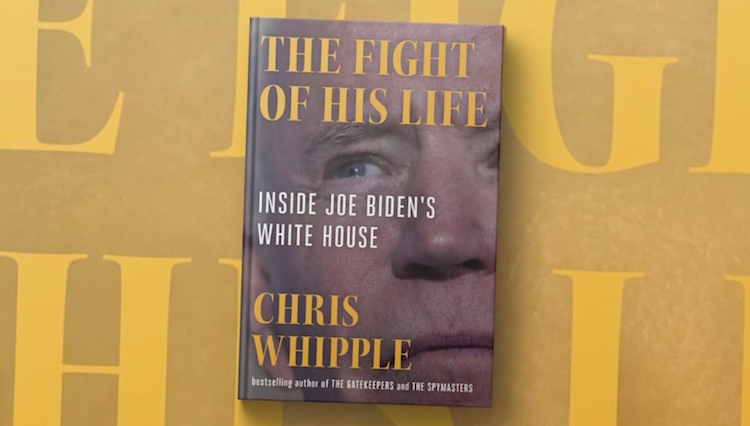
Bob Woodward and Robert Costa’s Peril included coverage of the first few months of the Biden presidency, but Chris Whipple’s The Fight of His Life: Inside Joe Biden’s White House is the first book to focus entirely on President Biden. Whipple covers the Biden administration from the election in November 2020 to last year’s midterms. Although he was granted an interview with Biden, it was conducted via email — preventing follow-up questions — presumably because White House staff were conscious of the President’s propensity for gaffes.
Whipple relies heavily on his more extensive access to Ron Klain, who was Biden’s chief of staff until earlier this year. He also interviewed numerous other senior figures in the administration, including Secretary of State Anthony Blinken, CIA director William Burns, and chairman of the Joint Chiefs of Staff Mark Milley. Whipple reveals Biden’s uneasy relationship with the Secret Service: “Wary of his own Secret Service agents, the president no longer spoke freely in their presence.”
Whipple’s strongest criticism of Biden relates to the US troop pullout from Afghanistan and the subsequent Taliban takeover of the country: “Both the decision to withdraw and its flawed execution belonged to him.” He presents conflicting accounts of the intelligence shown to the President prior to the withdrawal, which the White House regarded as flawed. Klain maintains: “Biden was being told by the military commanders [that] there would be a valiant defense of Kabul. That defense never showed up.” Blinken also blames “an intelligence assessment that proved to be wrong”.
This notion of an intelligence failure is rejected by the CIA: “President Biden, they insisted, was under no illusions. He understood the fragility of the Afghan military forces and had a clear-eyed view of the weaknesses of the Afghan political leadership.” Burns claims that the President was made fully aware of the risks, describing “a prescription for things unravelling pretty quickly... All of this, he said, was communicated to Joe Biden.” Similarly, Milley says that an imminent Taliban takeover had been foreseen: “The intelligence I saw predicted months”.
On the other hand, Whipple gives Biden considerable credit for his response to the Russian invasion of Ukraine, even describing him in Churchillian terms: “Biden had a few things in common with Churchill”. Biden’s view of Russian President Vladimir Putin — that he has no soul — is well documented, though Whipple adds that Biden regards Putin as a dictator in the same mould as Adolf Hitler: “He thought the Russian tyrant personified the evil he’d seen memorialized at Dachau”.
Whipple relies heavily on his more extensive access to Ron Klain, who was Biden’s chief of staff until earlier this year. He also interviewed numerous other senior figures in the administration, including Secretary of State Anthony Blinken, CIA director William Burns, and chairman of the Joint Chiefs of Staff Mark Milley. Whipple reveals Biden’s uneasy relationship with the Secret Service: “Wary of his own Secret Service agents, the president no longer spoke freely in their presence.”
Whipple’s strongest criticism of Biden relates to the US troop pullout from Afghanistan and the subsequent Taliban takeover of the country: “Both the decision to withdraw and its flawed execution belonged to him.” He presents conflicting accounts of the intelligence shown to the President prior to the withdrawal, which the White House regarded as flawed. Klain maintains: “Biden was being told by the military commanders [that] there would be a valiant defense of Kabul. That defense never showed up.” Blinken also blames “an intelligence assessment that proved to be wrong”.
This notion of an intelligence failure is rejected by the CIA: “President Biden, they insisted, was under no illusions. He understood the fragility of the Afghan military forces and had a clear-eyed view of the weaknesses of the Afghan political leadership.” Burns claims that the President was made fully aware of the risks, describing “a prescription for things unravelling pretty quickly... All of this, he said, was communicated to Joe Biden.” Similarly, Milley says that an imminent Taliban takeover had been foreseen: “The intelligence I saw predicted months”.
On the other hand, Whipple gives Biden considerable credit for his response to the Russian invasion of Ukraine, even describing him in Churchillian terms: “Biden had a few things in common with Churchill”. Biden’s view of Russian President Vladimir Putin — that he has no soul — is well documented, though Whipple adds that Biden regards Putin as a dictator in the same mould as Adolf Hitler: “He thought the Russian tyrant personified the evil he’d seen memorialized at Dachau”.
